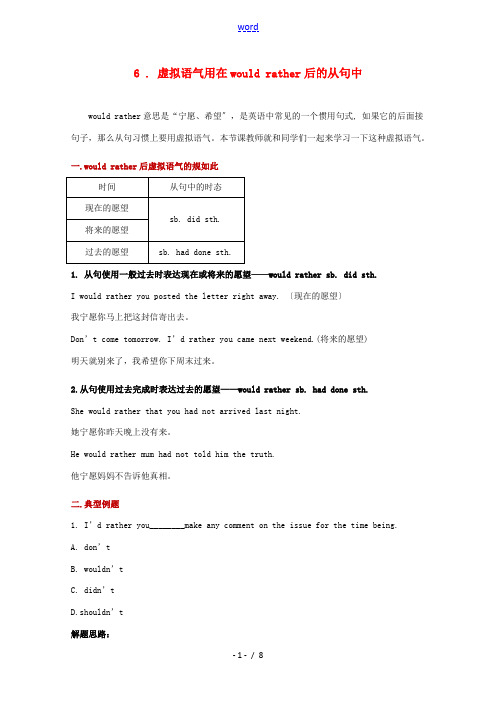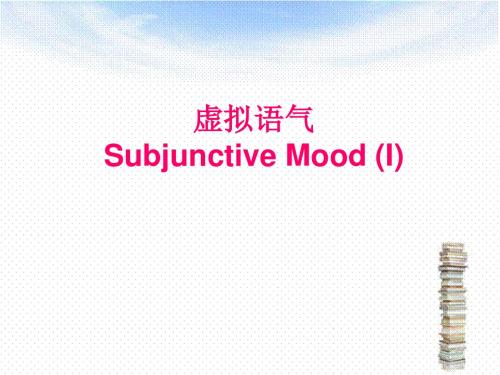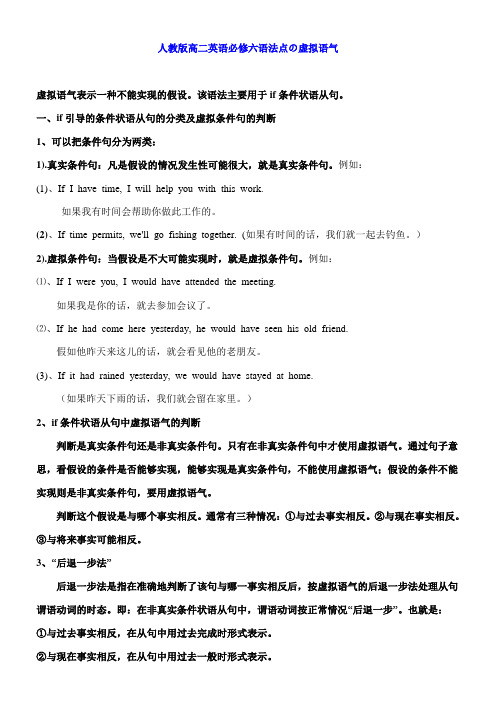人教版高二寒假教材讲义Lesson6虚拟语气-教师版
人教版选修6高二英语 虚拟语气课件公开课用

would rather you told me the truth. I would rather you came today/tomorrow.
5.表示祝愿或诅咒的祈使句。如: May you succeed! / God bless you!
与过去事 实相反 had done
If条件状语从句
含义
If 从句谓语动词
主句谓语形式
表示对未来
的虚拟
did should do were to
would/could do
One years later , maybe you will be in Zhejiang University
visited should visit
虚拟语气在其他从句中的运用 1.as if /as through 引导的方式状语从句“好象/似乎” 1.The woman takes good care of the orphans as if she were ______(be ) their own mother. had studied 2.She speaks English so fluently as if she __________ (study) it in England. were 3. It looks as if it______(be) going to rain 2.在It is (high)time (that) …从句中的用法:从句中的谓语动
词用一般过去时(be用were)或should + 动词原形,表示“(现在)该……”,但 此时should不可省略。如: It’s time that I picked up my daughter. / It’s high time we should plant trees there. 3. 在 if only句型中的用法:句中的谓语动词用一般过去时(be用were)或过 去完成时,表示“要是……该有多好啊!”如:If only I were a bird. / If only I had taken his advice. (同 as if wish )
高中英语 破题致胜微方法(虚拟语气2)6 虚拟语气用在would rather后的从句中-人教版高中

6 . 虚拟语气用在would rather后的从句中would rather意思是“宁愿、希望〞,是英语中常见的一个惯用句式, 如果它的后面接句子,那么从句习惯上要用虚拟语气。
本节课教师就和同学们一起来学习一下这种虚拟语气。
一.would rather后虚拟语气的规如此1. 从句使用一般过去时表达现在或将来的愿望——would rather sb. did sth.I would rather you posted the letter right away. 〔现在的愿望〕我宁愿你马上把这封信寄出去。
Don’t come tomorrow. I’d rather you came next weekend.(将来的愿望)明天就别来了,我希望你下周末过来。
2.从句使用过去完成时表达过去的愿望——would rather sb. had done sth.She would rather that you had not arrived last night.她宁愿你昨天晚上没有来。
He would rather mum had not told him the truth.他宁愿妈妈不告诉他真相。
二.典型例题1. I’d rather you________make any comment on the issue for the time being.A. don’tB. wouldn’tC. didn’tD.shouldn’t解题思路:①牢记would rather后的从句应该使用虚拟语气这一考查点;②根据时间状语判断虚拟语气的时间;③根据所表达的虚拟时间选择适宜的时态。
解析:would rather后的从句需要使用虚拟语气,题干中的时间状语for the time being意为“目前,现在〞,所以此题表达的是现在的愿望,从句中应该使用一般过去时。
2.To be frank, I would rather you ________the teacher’s advice last week.A. followedB. had followedC. would followD. have followed解题思路:①牢记would rather后的从句应该使用虚拟语气这一考查点;②根据时间状语判断虚拟语气的时间;③根据所表达的虚拟时间选择适宜的时态。
人教版高中英语选修六虚拟语气 精品优选公开课件

If it should snow tomorrow, we wouldn’t go out.
Should it snow tomorrow, …
3.含蓄虚拟条件 句
句中有without, but for(要不是), or, otherwise(否则,要不然)等词隐含某种假 设。 1.没有你的帮助,我们就不会实验成功。 Without your help, we couldn’t have
3.I suggest that we ________(hold) a meeting to discuss the matter.
5.虚拟语气特 殊句型
I wish I were a bird. If only I were a bird
I wish every day were my birthday. If only every day were my birthday
had done
would/could/should/ might+have+done
1. were/did
2. should+ V.(原) 3. were to do
would/could/should /might +V.(原)
Exercises
1. 如果你早来5分钟,你就赶上这趟车了。 If you _h_a_d_g_o_t_ (get) here five minutes earlier, you _w__o_u_ld__h_a_v_e__ca_u__g_h_t(catch) the bus. 2. 如果我现在不忙,我就来帮你了。 If I _w_e_r_e (be)not busy, I _w__o_u_ld__h_e_lp_ (help) y3o. 如u n果ow明. 天下雪了,我们怎么办? What _s_h_o_u_ld_ we do if it __w_e_r_e__to__s_n_o_w(snow)
人教版选修六虚拟语气课件(共21张PPT)

3. If someone called (call) you a fool, what would you say or do ?
Discuss with your deskmate and make a short dialogue.
If +主 +过去式(be动词的过去式用were).., 主+ would/could /should/ might +动词原形
2. Change the following sentences: 1. They are not here, so they can’t help you now. could ____ help you now. If they were _____ here, they _____ 2. He did not come yesterday, so I did not tell him about it. have If he ____ _____ yesterday, I would _____ _____ had come _____ told him about it.
如果农民没有看见蛇, him.Ifhadn’t the snake_____________him , bitten 他就不会把蛇放进怀里。 he wouldn’t __________________. 如果农民没把它放进怀里, have died 蛇就不会咬它,如果蛇不 咬农夫,农民就不会死。
小试牛刀
couldn’t/wouldn't have missed ________________________(miss) the bus. should rain/were to rain (3) If it _________________________(rain) tomorrow, the sports meet would be put off.
高中英语公开课虚拟语气课件新人教版选修课件

总结词
描述包含不同时间点的相反情况时,使用混合时间虚 拟语气。
详细描述
混合时间虚拟语气是指在一个句子中同时包含过去、现 在和未来的时间点,并通过虚拟语气来表达这些时间点 的相反情况。这种语气可以表达复杂的假设、回忆或遗 憾等情感,强调不同时间点之间的差异。在语法上,混 合时间虚拟语气通过动词的形式变化来体现,如使用 “had studied”代替“studied”,表示过去时间点 的相反情况;同时使用“would have passed”代替 “passed”,表示未来时间点的相反情况。
Mood • Practice and Analysis of Subjunctive
Mood
01
Overview of subjunctive mood
Definition and characteristics
01
02
Definition: The subjunctive mood is a grammatical construction used to express wishes, hypotheses, or strong beliefs in a less direct and formal way.
虚拟语气与过去事实 相反
当描述与过去事实相反的情况时,也 使用虚拟语气。例如,“If I had known the answer, I would have told you.”(如果我早知道答案,我 早就告诉你了。)
总结词
描述与过去事实相反的情况时,使用 虚拟语气。
详细描述
在英语中,当描述与过去事实相反的 情况时,通常使用虚拟语气。这种语 气可以表达假设、后悔或责备等情感 ,强调与过去事实之间的差异。在语 法上,虚拟语气通过动词的形式变化 来体现,如使用“had known”代替 “knew”,表示与过去事实相反的 情况。
高二虚拟语气课件

The Subjunctive MoodLearning methods( 学习目标):1.Master the usages of subjunctive mood in the if clauses(知识目标)2.Finish the exercises in the paper and try to master some useful structures in class(能力目标)Language difficulties(教学重难点):How to understand the subjunctive moodMoral aims(德育目标):Make sure the students can value what they have at present, and don’t spend too much time regretting not doing what they should have done.Leading inWatch a short movie and make sure the students know what is subjunctive mood. Definition•虚拟语气是一种特殊的动词形式.一是用来表示说话人所说的话不是一个事实,而是一种假设、猜测、怀疑等;一是表示说话人的愿望、要求、命令、建议等1. If 型与现在事实相反虚拟If I were a bird, I would have two wings.If I had two wings, I could fly in the sky.If I spoke their language, I should make friends with other birds.If I flew too low, I might be shot by a hunter.If I ____ as tall as Yao Ming, I ______ become a famous basketball player.If I ____ a lot of money, I _____ buy a villa(别墅).Group Work:如果我是一名百万富翁,我会给新店子中学建一座图书馆。
人教版高二英语必修六语法点の虚拟语气

人教版高二英语必修六语法点の虚拟语气虚拟语气表示一种不能实现的假设。
该语法主要用于if条件状语从句。
一、if引导的条件状语从句的分类及虚拟条件句的判断1、可以把条件句分为两类:1).真实条件句:凡是假设的情况发生性可能很大,就是真实条件句。
例如:(1)、If I have time, I will help you with this work.如果我有时间会帮助你做此工作的。
(2)、If time permits, we'll go fishing together. (如果有时间的话,我们就一起去钓鱼。
)2).虚拟条件句:当假设是不大可能实现时,就是虚拟条件句。
例如:⑴、If I were you, I would have attended the meeting.如果我是你的话,就去参加会议了。
⑵、If he had come here yesterday, he would have seen his old friend.假如他昨天来这儿的话,就会看见他的老朋友。
(3)、If it had rained yesterday, we would have stayed at home.(如果昨天下雨的话,我们就会留在家里。
)2、if条件状语从句中虚拟语气的判断判断是真实条件句还是非真实条件句。
只有在非真实条件句中才使用虚拟语气。
通过句子意思,看假设的条件是否能够实现,能够实现是真实条件句,不能使用虚拟语气;假设的条件不能实现则是非真实条件句,要用虚拟语气。
判断这个假设是与哪个事实相反。
通常有三种情况:①与过去事实相反。
②与现在事实相反。
③与将来事实可能相反。
3、“后退一步法”后退一步法是指在准确地判断了该句与哪一事实相反后,按虚拟语气的后退一步法处理从句谓语动词的时态。
即:在非真实条件状语从句中,谓语动词按正常情况“后退一步”。
也就是:①与过去事实相反,在从句中用过去完成时形式表示。
- 1、下载文档前请自行甄别文档内容的完整性,平台不提供额外的编辑、内容补充、找答案等附加服务。
- 2、"仅部分预览"的文档,不可在线预览部分如存在完整性等问题,可反馈申请退款(可完整预览的文档不适用该条件!)。
- 3、如文档侵犯您的权益,请联系客服反馈,我们会尽快为您处理(人工客服工作时间:9:00-18:30)。
人教版高二寒假教材讲义Lesson6虚拟语气-教师版Lesson 4 虚拟语气虚拟语气的定义:虚拟语气表示说话人的某种愿望、假设、怀疑、猜测和建议等,表示的是纯属假设或实现的可能性不大的情况。
虚拟语气是由句中的谓语的特殊形式表现出来的。
虚拟语气的用法一、虚拟语气用于条件句(条件状语从句)条件句可以分为两种:真实条件句和虚拟条件句。
①真实条件句是一种可能实现的条件句,且实现的可能性非常大。
在条件句中常用表示现在的某种时态代替表示将来的时态。
If I have time, I’ll come over to see you.如果有时间,我会来看你。
②虚拟条件句是一种表示不能实现或实现的可能性很小的条件句。
其谓语动词用虚拟语气。
If I had time, I should/would/could come over to see you.如果有时间,我会来看你。
1.虚拟语气在if条件句中的运用If my brother were here,everything would be all right.要是我哥哥在这儿的话,一切都没问题了。
If it should rain this afternoon,the basketball match would be put off.要是今天下午下雨,篮球比赛就会被推迟。
If you had taken my advice,you would not have failed in the exams.如果你早听了我的建议,你考试就能通过了。
[即时训练]A.表示与现在事实相反,条件从句用一般过去时,主句用“ would/should/could/might+动词原形”。
①If I (be) you, I (try) it again.②If he (be) free, he (go) with you.B.表示与过去事实相反,条件从句用“had+ 过去分词”,主句用“ would/should/could/might+ have+过去分词”。
①If he (work) hard, he (pass) the examination.②If he (b e) there, he (see) the film.C.表示与将来的事实相反,条件从句用一般过去时、should/were to+ 动词原形,主句用“ would/should/could/might+动词原形”。
①If it (snow) tomorrow, they (not go) out.②If he (come) here tomorrow, I (tell) him about it.【答案】① If I were you, I would try it again.②If he w ere free, he would go with you③.If I had one million dollars, I would buy the plane2.虚拟条件句中的省略与倒装如果虚拟条件句中含有were/had/should,有时可把if省略,把were/had/should提到主语之前形成倒装;若为否定形式,not不可提前。
Had he caught the morning train,he would not have been late for the meeting.要是他赶上了早晨的火车,那他就不会开会迟到了。
注:若省略的条件句中的谓语动词是否定形式时,不能用动词的缩略形式。
Weren’t it for the expense, I would go abroad now. (×)Were not it for the expense, I would go abroad now. (√)[即时训练]1.If you had come earlier,you would have caught the early bus.=come earlier,you would have caught the early bus.2. If I were twenty now,I would join the army.=twenty now,I would join the army.3. If he should come,tell him to ring me up.=,tell him to ring me up.【答案】1.Had you, 2.Were I, 3.Should he come3.错综时间条件句有时条件句的动作与主句动作发生的时间不一致,这时动词的形式应根据它们各自表示的时间加以调整。
If we had booked a table earlier,we wouldn’t be standing here in a queue now.如果我们早些订位子,现在也就不用站在这里排队了。
(if条件句是对过去的虚拟,而主句是对现在的虚拟。
) [即时训练]1.如果你当时听了我的话,现在就能完成这份工作了。
(从句说明过去,主句说明现在。
)If you (follow) my advice, you would be able to finish the work now.2.如果我是你,我就去参加她的生日晚会了。
(从句说明现在,主句说明过去。
)If I (be) you, I (go) to her birthday party.1.If you had followed my advice, you would be able to finish the work now.2.If I were you, I would have gone to her birthday party.4.含蓄条件句(1)有时假设的情况不用条件句表达,而是用but for,without等介词(短语)或上下文来表示。
We wouldn’t have finished the project on time without your timely help.如果没有你的及时帮助,我们就不能按时完成那项工程了。
(2)用连词otherwise,or等暗示后文与前面的情况相反,从而引出后文的虚拟语气。
I was ill that day.Otherwise,I would have taken part in the sports meeting.我那天病了,否则,我就参加运动会了。
(3)虚拟条件通过but暗示出来,模式为“虚拟情况+but+真实情况”。
I would have taken part in the sports meeting,but I was ill that day.我本来可以参加运动会,但是那天我病了。
[即时训练]1.Without/But for your help,I (not pass) the test.=If you (not help) me, I (not pass) the test.2.Take an umbrella with you in case it (rain).3.He was not present, otherwise,he (help) us.4.We (not stay) together for a single minute but for a phone call.5. Without electricity human life quite different today.A. isB. will beC. would have beenD. would be【答案】①I wouldn’t have passed the test.you hadn’t helped me, I wouldn’t have passed the test②should rain③ he would have helped us④could not have stayed together 5.D二、虚拟语气用于名词性从句中1.在“It is+important/necessary/natural/strange/essential/vital/...+that...”句型中,从句谓语动词用“(should+)动词原形”。
It’s vital that we (should) take our safety driving along the road seriously.在路上开车时认真对待我们的安全非常重要。
[即时训练]1.It is strange that tourists (not visit) this place.2.It is necessary that he (sort out) the information for my reference.【答案】1.tourists (should) not visit this place2. he (should) sort out the information for my reference2.在would rather (that)后的宾语从句中,从句的谓语动词如果表示现在或将来要发生的动作,从句用一般过去时;如果表示过去发生的动作,从句用过去完成时。
I’d rather he had gone to the seaside with m e the day before yesterday.要是他前天和我一起去海边就好了。
[即时训练]1.I would rather I (not tell) him the bad news.2.I’d rather you (come) tomorrow than today.【答案】1.I would rather I hadn’t told him the bad news.2. I’d rather you came tomorrow than today.3.句中含有以下单词或其变形时,其后所跟的名词性从句(宾语从句、表语从句、主语从句或同位语从句)部分常用虚拟语气,其谓语动词形式为“should+动词原形”,其中should可以省略。
He suggested that we (should) start off early the next day.他建议我们第二天早点出发。
[名师指津] 当suggest表示“暗示,表明”之意,insist表示“坚持说”之意时,suggest/insist后的宾语从句不使用虚拟语气,而使用陈述语气。
The smile on his face suggested that he was satisfied with our work.他脸上的微笑表明他对我们的工作很满意。
